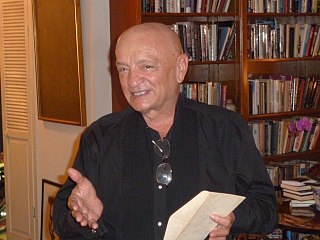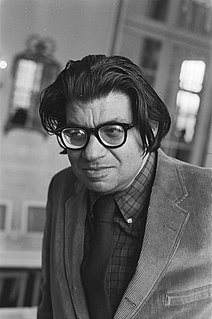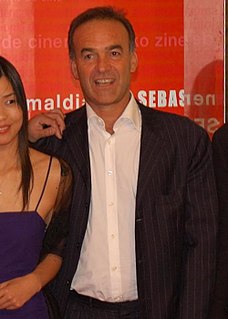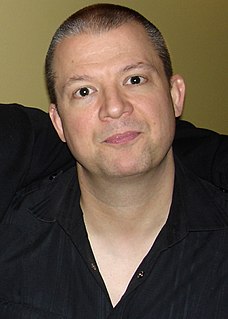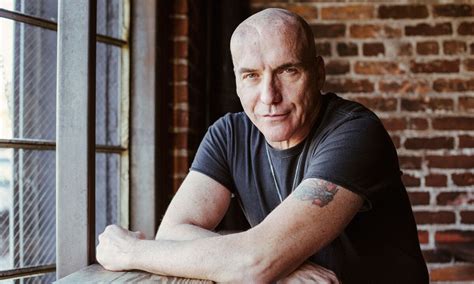Top 637 Construct Quotes & Sayings - Page 11
Explore popular Construct quotes.
Last updated on April 17, 2025.
I would not have majored in English and gone on to teach literature had I not been able to construct a counterargument about the truthfulness of fiction; still, as writers turn away from the industrious villages of George Eliot and Thomas Hardy, I learn less and less from them that helps me to ponder my life. In time, I found myself agreeing with the course evaluations written by my testier freshman students:'All the literature we read this term was depressing.' How naive. How sane.
You must stop editing--or you'll never finish anything. Begin with a time-management decision that indicates when the editing is to be finished: the deadline from which you construct your revisionary agenda. Ask yourself, 'How much editing time is this project worth?' Then allow yourself that time. If it's a 1,000-word newspaper article, it's worth editing for an hour or two. Allow yourself no more. Do all the editing you want, but decide that the article will go out at the end of the allotted time, in the form it then possesses.
It appears to me that the subject of music, from Machaut to Boulez, has always been its construction. Melodies of 12-tone rows just don't happen. They must be constructed....To demonstrate any formal idea in music, whether structure or stricture, is a matter of construction, in which the methodology is the controlling metaphor of the composition...Only by 'unfixing' the elements traditionally used to construct a piece of music could the sounds exist in themselves--not as symbols, or memories which were memories of other music to begin with.
Perhaps that is our doom, our human curse, to never really know one another. We erect edifices in our minds about the flimsy framework of word and deed, mere totems of the true person, who, like the gods to whom the temples were built, remains hidden. We understand our own construct; we know our own theory; we love our own fabrication. Still . . . does the artifice of our affection make our love any less real?
This is an important distinction, because most of the modern philosophies that deny that we can know reality, and ultimately truth, make the mistake of constructing epistemological systems to explain how we know reality without first acknowledging the fact that we do know reality. After they begin within the mind and find they can't construct a bridge to reality, they then declare that we can't know reality. It is like drawing a faulty road map before looking at the roads, then declaring that we can't know how to get from Chicago to New York!
I heard friends and strangers saying, "You don't look Arab - what are you supposed to be?" It really is a tired old problem for children of immigrants and kids of mixed race, constantly trying to explain yourself. Eventually, you give up and say, "Okay, what do you think I am?" When you're in the midst of it, you come to understand that "race" is a loose social construct, a series of visual impressions, and that your identity can be whatever the hell crazy thing you want it to be, you just have to grow a sense of humor and cultivate selective deafness.
Armament should be an illegality everywhere, and some sort of international force should patrol a treaty-bound world. Partial armament is one of those absurdities dear to moderate-minded 'reasonable' men. Armament itself is making war. Making a gun, pointing a gun, and firing it are all acts of the same order. It should be illegal to construct anywhere upon earth any mechanism for the specific purpose of killing men. When you see a gun it is reasonable to ask: 'Whom is that intended to kill?'
Gender is not something that one is, it is something one does, an act... a "doing" rather than a "being". There is no gender identity behind the expressions of gender; that identity is performatively constituted by the very "expressions" that are said to be its results. If the immutable character of sex is contested, perhaps this construct called 'sex' is as culturally constructed as gender; indeed, perhaps it was always already gender, with the consequence that the distinction between sex and gender turns out to be no distinction at all.
When two terms belong to the same category, it is proper to construct conjunctive propositions embodying them. Thus a purchaser may say that he bought a left-hand glove and a right- hand glove, but not that he bought a left-hand glove, a right- hand glove, and a pair of gloves. 'She came home in a flood of tears and a sedan-chair' is a well known joke based on the absurdity of conjoining terms of different types. Now the dogma of the Ghost in the Machine does just this. It maintains that there exist both bodies and minds.
I see "demand creation" as a 20th-century construct that's bound up with advertising. It's an outmoded view of marketing that says, "First, we build a product or service, then we advertise it into people's lives." Embedded this view is the belief that companies control brands. This is a myth. My message all along has been that brands are actually created by customers, not companies. Companies only provide the raw materials - the products, messaging, behaviors - that people use these to create brands.
Most people confuse the "now" with what is happening to them in the now. Actually what is happening to you now has nothing to do with the present moment itself. If you were to suddenly die the present moment would remain. The problem occurs when we attach in our minds with what is happening to "us" presently. This is simply a mental construct that we have created ourselves. It is much like a grievance, either real or imagined. If we attach to grievances we are constantly inflicting suffering on ourselves, not the other party.
I will say that the God concept is at the heart of 2001 but not any traditional, anthromorphic image of God. I don't believe in any of Earth's monotheistic religions, but I do believe that one can construct an intriguing scientific definition of God, once you accept the fact that there are approximately 100 billion stars in our galaxy alone, that each star is a life-giving sun and that there are approximately 100 billion galaxies in just the visible universe.
Our thoughts, our language, are always at a distance from whatever they're trying to describe. We're dreamers and - since we only have one life, and if we screw up we can get in a world of trouble - we're very intense dreamers. That's the beauty and the terror of being human beings: We just have these symbolic languages, these dreams, and that's all it ever is. There is no American or Frenchhistory. There are all these dreams that are floating around. People construct them and fight with them and criticize them, and the world goes on. I don't think the stars pay much attention.
Human social life, I suggest, is the magma that erupts and builds up, so to speak, at the fault lines where natural human capacities meet and grind against and over natural human limitations…. This meeting of powers and limitations produces a creative, dynamic tension and energy that generates and fuels the making of human social life and social structures…. It is real human persons living through the tensions of natural existential contradictions who construct patterned social meanings, interactions, institutions, and structures.
Knowledge signifies things known. Where there are no things known, there is no knowledge. Where there are no things to be known, there can be no knowledge. We have observed that every science, that is, every branch of knowledge, is compounded of certain facts, of which our sensations furnish the evidence. Where no such evidence is supplied, we are without data; we are without first premises; and when, without these, we attempt to build up a science, we do as those who raise edifices without foundations. And what do such builders construct? Castles in the air.
We cannot afford to be idle. To act on a bad idea is better than to not act at all. Because the worth of the idea never becomes apparent until you do it. Sometimes this idea can be the smallest thing in the world, a little flame that you hunch over and cup with your hand, and pray will not be extinguished by all the storm that howls about it. If you could hold onto that flame, great things could construct around it, that are massive and powerful and world changing, all held up by the tiniest of ideas.
If someone does a study which, for statistical reasons, I think is hopelessly underpowered or nonidentified, my best and most useful advice will not be tips on how to calculate p-values better, or how to construct an explanation for some particular data pattern. Rather, my advice will be to start over, to reconsider what you think you already know, maybe to question some prominent work in your subfield, and quite possibly to think a lot harder about measurement, and about the relation of your data to your underlying constructs of interest.
The outside-in discipline requires that you have an explicit customer-based reason for everything you do in the marketplace. Managers need to create what I call "customer pictures," verbal descriptions of customers that highlight the key customer characteristics and make those customers come alive. Although managers never know as much about customers as they want and need to know, the outside-in discipline requires that they construct customer pictures anyway, basing the pictures on whatever hard data they have plus hypotheses and intuition.
What I've done serves mostly to show that nearly all limits are self-imposed, a false construct of the mind. You can take on mind-boggling challenges. It may cause you grief, it may test your relationships and cause you to question your sanity, but you can do it! Yes, a fifty-seven year-old man can run across the United States and break a couple or records in the process. People of any age can accomplish what few others have done; we can endure the trials, overcome the obstacles, put up with the pain to realize our dreams. Why not try?
If we are ever to construct a feminist movement that is not based on the premise that men and women are always at war with one another, then we must be willing to acknowledge the appropriateness of complex critical responses to writing by men even if it is sexist. Clearly women can learn from writers whose work is sexist, even be inspired by it, because sexism may be simply one dimension of that work. Concurrently fiercely critiquing the sexism does not mean that one does not value the work.
You know so many documentaries now are very carefully scripted before you start, and then people are sort of put in chairs which are beautifully lit, and they tell their stories and you do that with another 10 people and you then construct a story from what they say. You do a sort of paper thing, and then you put some images in-between, and that's your film. And that's so not what I think is a good documentary. It can be so much more than that, it should be much more of an adventure and much more uncertain... like real things are.
We all build internal sea walls to keep at bay the sadnesses of life and the often overwhelming forces within our minds. In whatever way we do this—through love, work, family, faith, friends, denial, alcohol, drugs, or medication—we build these walls, stone by stone, over a lifetime. One of the most difficult problems is to construct these barriers of such a height and strength that one has a true harbor, a sanctuary away from crippling turmoil and pain, but yet low enough, and permeable enough, to let in fresh seawater that will fend off the inevitable inclination toward brackishness.
Nature has but one plan of operation, invariably the same in the smallest things as well as in the largest, and so often do we see the smallest masses selected for use in Nature, that even enormous ones are built up solely by fitting these together. Indeed, all Nature's efforts are devoted to uniting the smallest parts of our bodies in such a way that all things whatsoever, however diverse they may be, which coalesce in the structure of living things construct the parts by means of a sort of compendium.
It just seems like right now we’re in a place where people are being witch-hunted for expressing an opinion. Even if it’s a lousy opinion or a shitty opinion, and comics I don’t think can ever fall into the trap of any groups that want to censor what a person says or thinks or punish a person for expressing what they think. Anything you say about a social issue is going to offend half the country. I don’t care how nicely you say it, I don’t care how well you construct the joke, simply by stating the opinion, you are for something and anti something else.
You can get a coalition of senators from particular states in America, for example, who want to construct highways or dams or ports which may well be very inefficient. The taxes would be paid by the people over the whole country, but the benefits would go to the few people in those particular locations. This type of spending is a rather gross waste of resources that worsened over the years as the government has been allowed to do more particularized things.
CREATIVITY is when you are not, because creativity is the fragrance of the creator. It is the presence of God in you. Creativity belongs to the creator, not to you. No man can ever be creative. Yes, man can compose, construct, but can never be a creator. When man disappears, when man becomes utterly absent, a new kind of presence enters his being - the presence of God. Then there is creativity. When God is inside you His light that starts falling around you is creativity. The climate that arises around you because of the presence of God within you is creativity.
Do not talk about giftedness, inborn talents! One can assume great men of all kinds who were very little gifted. They acquired greatness, became “geniuses” (as we put it), through qualities the lack of which no one who knew what they were would boast of: they all possessed that seriousness of the efficient workman which first learns to construct the parts properly before it ventures to fashion a great whole; they allowed themselves time for it, because they took more pleasure in making the little, secondary things well than in the effect of a dazzling whole.
Here's an easy one: "Race is an entirely social construct." No, it's partially one, depending on how any given society seeks to define it and its implications. But there are basic things such as skin color and hair texture. Even a Martian who'd had no exposure to human "social constructs" would be able to spot those differences. But no Martian, as hard as he tried, could point at a "culture" or to "equality." Those are the social constructs. Those can't be measured in the same way as human DNA.
There is a deep sense in which we are all ghost towns. We are all haunted by the memory of those we love, those with whom we feel we have unfinished business. While they may no longer be with us, a faint aroma of their presence remains, a presence that haunts us until we make our peace with them and let them go. The problem, however, is that we tend to spend a great deal of energy in attempting to avoid the truth. We construct an image of ourselves that seeks to shield us from a confrontation with our ghosts. Hence we often encounter them only late at night, in the corridors of our dreams.
Family seems so rich and complicated to me. There's meant to be this unfailing biological loyalty and yet at the same time it's this theatre for various kinds of cruelty. I know it doesn't always work out that way, but the worst possible behaviour is sort of allowed for. It looks to me like an endlessly rich container for really terrible drama, but also pretty grand love. It accommodates such a variety of feeling in such a natural way, and it feels so relatable, and yet it's such a funny construct, socially, the family.
But as the work proceeded I was continually reminded of the fable about the elephant and the tortoise. Having constructed an elephant upon which the mathematical world could rest, I found the elephant tottering, and proceeded to construct a tortoise to keep the elephant from falling. But the tortoise was not more secure than the elephant, and after some twenty years of very arduous toil, I came to the conclusion that there was nothing more that I could do in the way of making mathematical knowledge indubitable.
Our faith in democracy, personal freedoms and human 'rights', and the other comforting prescriptions of the humanist liberal credo stem from the supremacy of maritime over territorial power. Pragmatists may deplore this as crude determinism, as another vain attempt to construct a general theory of history. They should reflect on the sort of political philosophy and structures we might now adhere to had the Habsburgs, Bourbons, Bonaparte, Hitler, Stalin or his heirs prevailed in the titanic world struggles of the past four centuries.
We're being asked to continually be "authentic" and "honest" with the world through social media. There's a demand to post our wedding pictures, baby pictures (only minutes after the birth), our relationship status, and our grief and joys on Facebook and Instagram. Similarly, we construct persona through dating apps and networking sites. All of these social media networks exert pressure on us to share the personal details of our lives with unknown masses. So the pressure on the characters in "Openness" isn't merely romantic, but public/social as well.
We have inherited a fear of memories of slavery. It is as if to remember and acknowledge slavery would amount to our being consumed by it. As a matter of fact, in the popular black imagination, it is easier for us to construct ourselves as children of Africa, as the sons and daughters of kings and queens, and thereby ignore the Middle Passage and centuries of enforced servitude in the Americas. Although some of us might indeed be the descendants of African royalty, most of us are probably descendants of their subjects, the daughters and sons of African peasants or workers.
I've been labelled many times - a criminal, an anarchist, a rebel, sometimes human garbage, but never a philosopher, which is a pity because that's what I am. I chose a life apart from the common flow, not only because the common flow makes me sick but because I question the logic of the flow, and not only that - I don't know if the flow exists! Why should I chain myself to the wheel when the wheel itself might be a construct, an invention, a common dream to enslave us?
I feel like people have more in common than the news reports. People getting along doesn't sell very well in the news. I find that to be deeply depressing. I don't even talk about it on stage, because it would take too long to explain. I'd have to spend an hour on it to get people to understand what I'm saying because it's so instantly polarizing. Because cable news has kind of set up a construct where you're for or against something immediately. So if I said something about it, people would be for or against me immediately. And I don't want that.
Let's admit that feminism came from liberalism and it was very positive. But then it went dark. It went into a bad place. When feminism replaced biology with social construct, they started to say that everything about a human being was created by your environment or by your - by environmental cues as opposed to innate traits... Like you didn't achieve what you could get because it was your fault. They denied traits that are applied across all cultures. And that's where feminism went wrong is it denied biology and makes them look foolish.

